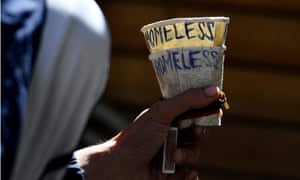Payment suspensions under new compliance regime condemned as a ‘social security horror show’
About 55,000 jobseekers who were without a home or on the cusp of
homelessness have had their welfare payments temporarily suspended under
the government’s new compliance regime, despite the Coalition saying it would include “protections for the most vulnerable”.
Updated Senate estimates figures show 55,714 homeless or at-risk people who get payments such as Newstart received a suspension between July 2018, when the system came into effect, and December 2018.
As of 31 December, Centrelink counted 58,878 homeless jobseekers on its books, though the total number over the six-month period would be greater as people moved in and out of the system.
As Scott Morrison and Bill Shorten faced questions about the low rate of Newstart on the campaign trail on Friday, the chief executive of the Australian Council of Social Service, Cassandra Goldie, said the new figures showed “the social security horror show in action”.
“Social security experts including Acoss repeatedly warned the
federal government that the [new compliance regime] would lead to huge
numbers of people being cut off from income support, including people in
very vulnerable circumstances,” she said.Updated Senate estimates figures show 55,714 homeless or at-risk people who get payments such as Newstart received a suspension between July 2018, when the system came into effect, and December 2018.
As of 31 December, Centrelink counted 58,878 homeless jobseekers on its books, though the total number over the six-month period would be greater as people moved in and out of the system.
As Scott Morrison and Bill Shorten faced questions about the low rate of Newstart on the campaign trail on Friday, the chief executive of the Australian Council of Social Service, Cassandra Goldie, said the new figures showed “the social security horror show in action”.
The Department of Jobs and Small Business also revealed 50,843 job seekers who had a mental illness had their payment suspended, and 48,022 single-parent job seekers received a payment suspension. Jobseekers can have multiple vulnerability indicators on their file.
The government introduced the new system in a bid to crack down on what it said was a small cohort of wilfully non-compliant jobseekers. Financial “penalties” – such as having a fortnight’s payment docked or being kicked off welfare – have been significantly reduced, including for those classified as vulnerable under the new system.
Instead, the system emphasises payment “suspensions”, where money is stopped because a person missed an appointment or other “mutual obligation” and is only restored once a person “re-engages” with the system.
But advocates argue that if the payments are not restored in time, people are left without money to pay for food or rent.
Earlier figures, analysed by Guardian Australia in January, had revealed 20,000 people considered homeless or at-risk were handed at least one “demerit point” in the first three months. A demerit point is usually accompanied by a temporary payment suspension, with six points leading to the harsher “financial penalty”.
The new figures, which include suspensions handed out when a job services provider decided not to penalise the person with a demerit, suggest the impact has been greater.
Jenny Smith, the chair of Homelessness Australia, said suspending incomes among the vulnerable was “effectively a hard shove into destitution and homelessness”, while the Greens senator Rachel Siewert said the figures were “deeply distressing”.
The department also confirmed 5,103 homeless or at-risk jobseekers lost their income support entirely because they failed to “re-engage” with the job services provider or Centrelink after their payments were suspended. Departmental officials told Senate estimates last week people could fail to “re-engage” for a number of reasons, including finding work.
A spokesman for the jobs minister, Kelly O’Dwyer, said the new system had caused a significant reduction in the number of penalties imposed on jobseekers.
“The Coalition is committed to supporting those who need assistance to find a job, but it is a two-way street,” he said. “The majority of payment suspensions are lifted within three days. Overwhelmingly, those who have their payments suspended have them reversed before their regular payment date.”
A Labor spokeswoman would not say whether a Shorten government would keep the compliance regime. “Under Labor, mutual obligation and any compliance measures that go with it will be aimed at helping people to get off income support and into sustainable work,” she said.

No comments:
Post a Comment